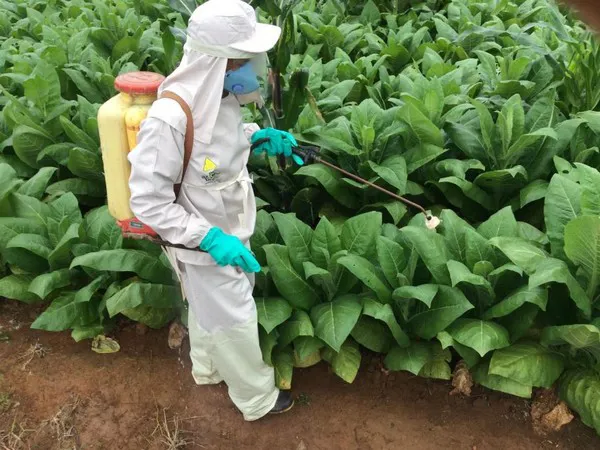A new CABI-led study has found that mass media campaigns aimed at changing pesticide use to fight crop pests and diseases are more effective when farmers are exposed to multiple forms of communication.
CABI scientists collaborated with colleagues from the Rwanda Agriculture and Animal Resources Department Board (RAB) to study the effects of mass media campaigns on pesticide use among smallholder farmers in Rwanda and Uganda.
They found that campaigns improve farmers’ knowledge of pesticide risks and safety measures, boost the adoption of environmentally safer alternatives to synthetic pesticides, and increase the use of personal protective equipment.
Dr. Justice Tambo, the leading author of the paper, which was published in the Journal of Rural Studies, said that the changes in behavior regarding pesticide use are more pronounced when farmers are exposed to multiple information channels.

These mass media channels include interactive radio, plant health rallies, mobile SMS, and video screenings.
In Rwanda, for instance, the likelihood of adopting multiple Integrated Pest Management (IPM) practices increased by about 19%, 38%, and 50% when the information is received through Radio only, Radio and SMS and Radio, SMS and Public Health Rallies, respectively.
Dr. Tambo said, “We find that the mass media campaigns are significantly associated with improved farmer knowledge of pesticide risks and safety precautions.
“While the campaigns appear not to have discouraged the use of synthetic pesticides, they are significantly associated with increased adoption of safer alternatives to pesticides, including sustainable integrated pest management practices.”
Dr. Tambo added that the campaigns are also significantly correlated with the increased use of protective equipment against pesticide exposure in both countries and reduced incidence of pesticide-related illnesses in Rwanda.
To promote safe pesticide use among farm households in Rwanda and Uganda, CABI, in collaboration with RAB and Uganda’s Ministry of Agriculture, Animal Industries and Fisheries (MAAIF) and several local partners, implemented information campaigns in major maize-producing areas of the two countries as part of the CABI-led Plantwise program.
The channels used were radio, mobile SMS, and PHRs in Rwanda, and radio, mobile SMS, and video screenings in Uganda. The campaign messages were delivered in the Kinyarwanda and Runyoro languages of Rwanda and Uganda, respectively.
Radio was the most popular source of pesticide information in both countries, especially in Uganda.
Dr. Tambo said, “The proliferation of ICTs in developing countries can allow the dissemination of information to a wide range of farmers through mass media campaigns, thereby complementing the efforts of traditional face-to-face information delivery methods.
“Our findings also highlight other actions needed to improve pesticide safety practices in the study countries besides information interventions.
“For instance, given the increased use of toxic synthetic pesticides without or with limited protective equipment, policy efforts are needed to increase the supply and use of lower-risk pesticides such as biopesticides, alongside the promotion of PPE use to reduce the risk of pesticide exposure.
“Such efforts could include improving the registration of biopesticide products and providing subsidies to spur adoption, as highlighted by previous research.”
The scientists also found that the receipt of pesticide safety information is significantly associated with an almost 20% higher likelihood of using multiple PPE items while spraying pesticides in both countries.
In addition, the researchers report that smallholder farmers in Rwanda who received safety advice were 48% less likely than their non-recipient counterparts to experience a pesticide-related health symptom.
Dr. Tambo added that the study contributes to the pesticide risk reduction goal of the PlantwisePlus program, which aims to reduce the reliance on high-risk farm inputs that have adverse effects on human health and biodiversity. An additional benefit is to work towards meeting the demand for safer and locally produced food.
For more information: CABI
CABI
www.cabi.org
